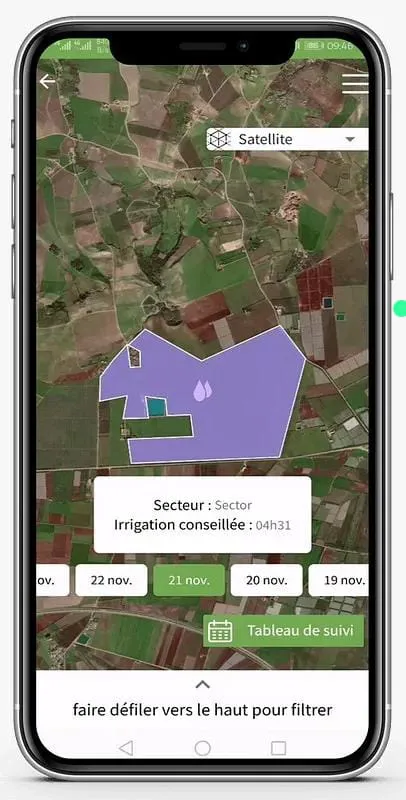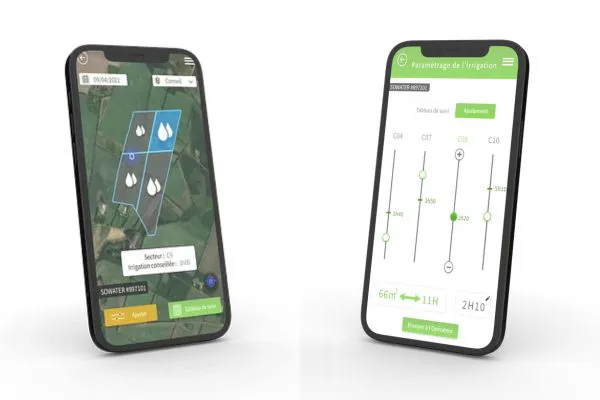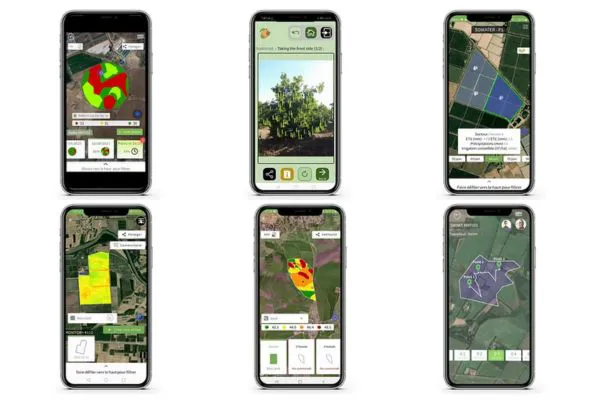Morocco is facing its worst drought season in 3 decades. Due to the persistent drought, dam reserves and water tables are exhausted in several regions. The depletion of the water table is so severe that many farmers have stopped production altogether, while others rely totally on seawater desalination plants. "A change in agricultural operations is needed. The optimization of water resources has become a necessity, even in regions that do not yet have this problem in an acute way," says Hamza Bendahou, co-founder of the agri-tech company SOWIT.

"We are at the crossroads of remote sensing, machine learning, and agronomy. We aim to help farmers optimize their critical operations, such as fertilization, irrigation, harvest scheduling, and yield estimation, through several services, using our mobile application of the same name “SOWIT” available here."
 Sowit mobile app includes a water resources optimization product called SOWATER®, which addresses the pressing needs of the agricultural sector in Morocco and various other African countries, Hamza explained. "SOWATER® allows to control irrigation through satellite imagery and weather data and gives the farmer the recommended irrigation need on a daily basis, as well as an irrigation schedule over 6 days. It is a feature that is updated daily, based on the weather, and can be customized according to the irrigation system. We also offer the possibility to install capacitive sensors to measure soil moisture, water level, conductivity, soil temperature, and PH; and to send automatic alerts to the farmer, for example, when the irrigation is below or exceeds the capacity of the crop."
Sowit mobile app includes a water resources optimization product called SOWATER®, which addresses the pressing needs of the agricultural sector in Morocco and various other African countries, Hamza explained. "SOWATER® allows to control irrigation through satellite imagery and weather data and gives the farmer the recommended irrigation need on a daily basis, as well as an irrigation schedule over 6 days. It is a feature that is updated daily, based on the weather, and can be customized according to the irrigation system. We also offer the possibility to install capacitive sensors to measure soil moisture, water level, conductivity, soil temperature, and PH; and to send automatic alerts to the farmer, for example, when the irrigation is below or exceeds the capacity of the crop."
In the sector of IT services for farmers, competition is fierce with a multitude of offers. To stand out, it is essential to master the scientific aspect of the provided services. Hamza says, "We are aware of the importance of independent evaluation of our services and the accuracy of our advice. In this regard, the effectiveness of SOWIT's products has been measured and proven in a scientific and empirical way. An independent study conducted by USAID, as part of the WE4F (water and energy for food) program, has measured the impact of using Sowater® in the field at our customers' farms, and has determined that water savings due to the use of the product reached 20-25%."
"Regarding the scientific aspect of our solutions, we walk on two feet," adds Hamza, "the raw material we use is based on satellite imagery, which is taken into account in the control and agronomic validation of the models we propose to farmers; and these models vary to take into consideration the agro and pedoclimatic conditions. Then, we have research partnerships with reference research institutes such as INRA in Morocco, Cirad in France, and EIAR in Ethiopia, which allow us to develop these agronomic models and ensure their compatibility with real working conditions."

Moreover, the adoption and acceptance of IT solutions by farmers is a determining factor, and this depends on several parameters such as user experience, financial cost, and time of implementation. "We take this concern into account," says Hamza. "We work with large farmers who have a level of organizational maturity that allows them to adopt the advanced services we offer. But we have also adapted our products to small-scale farmers, dedicating a completely free and accessible environment to them, without the need for advanced agronomic or computing knowledge."
Hamza continues, "All the information is made digestible, and we simply give an output. For example, we simply tell users how much nitrogen or how many units of ammonium nitrate are needed on the parcel when we talk about fertilization, how much water to use if we talk about irrigation, what the estimated yield on the parcel in a hectare, etc.... Several services such as satellite imagery, water stress indicators, vegetation indicators, weather, etc., are free of charge, and the user is not even asked to provide their name or phone number. When the user is ready to take the next step, we assist them based on their profile and needs."

SOWIT's app has currently more than 11,000 active users operating 40,000-50,000 ha, 35% of which are in Morocco, and the rest in other African countries, according to figures provided by Hamza. "We expect a large expansion of use, given the situation in Morocco this season," he adds.
"We also offer other B2B services, using the data that is generated from the advice we give to farmers, consolidating it to provide information to institutions in order to improve their services to farmers, such as credit or insurance products for example, in a 'virtuous circle of data' model."
For more information:
Hamza Benhadou
Sowit
Tel: +212 6 41 06 62 14
www.sowit.fr










